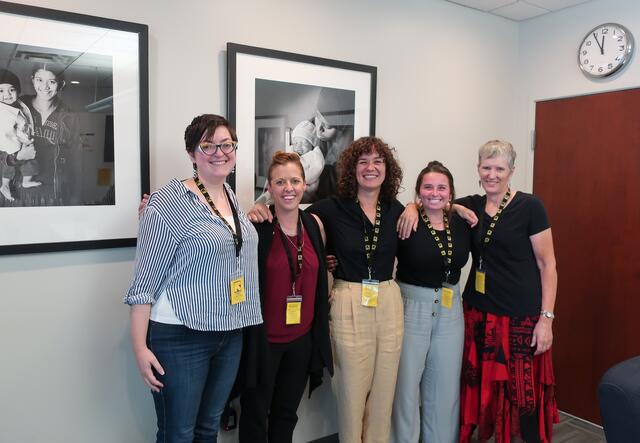For 20 years, the International Rescue Committee (IRC) in Salt Lake City has partnered with the University of Utah Occupational Therapy (OT) program to provide an OT level two field study experience for advanced students from across the U.S. The IRC has hosted OT students who join the IRC team for 12 weeks at a time each fall, spring and summer semester. Yda Smith, University of Utah professor of Occupational & Recreational Therapies, began this partnership with the IRC in 2003 and has continued to oversee the program since.
“I love this program because it advocates for what Occupational Therapy is all about: how we occupy our time. Here we can work in an Occupation based environment. We are out in the real world doing real, everyday tasks with clients,” said Yda.
The current summer semester includes four OT students. Each student takes a caseload of six to seven clients at a time, allowing them to spend optimal time with the families and individuals they are serving. Their work could take on a variety of forms, from serving kids in their schools or helping clients with different physical disabilities, to become more independent in their home and community environments, to teaching people how to use the stove or figuring out how to pay bills.

The OT students practice “activity analysis,” analyzing the variety of skills needed to be successful with a task and breaking that task down to manageable actions that will support their client’s independence. “A big part of our job is to look at a task we do every day that we take for granted. Then we work to create a step-by-step so that others are able to accomplish that task,” noted Jess Principe, a current OT student intern volunteering at the IRC in Salt Lake City this summer. Students create adaptive strategies that are a good fit for the client and are able to practice the activity as much as needed.
Most students studying OT would complete their level two field study in a clinical setting, so why commit time at a less formal environment like the IRC? This OT program is unique because resettlement agencies do not have acting occupational therapists on their staff. However, this type of care looks at the holistic needs of an individual facing acute challenges during resettlement to the U.S. The unique environment combined with service to a diverse community provides an excellent and practical learning environment. A testament to the success of the program’s innovation and focus on immersion, Yda recently received the Smith Innovation Award from the New England OT Education Council after a nomination from the Massachusetts General Hospital Institute of Health Professions. The award recognized Yda’s efforts to provide “exceptional occupational therapy fieldwork education.”
“The most common theme I have seen from working with the refugee population is resilience,” said Annie Hollenbeck, another current OT student, “They are so grateful to learn how to do things on their own.” One example of resilience was when the OT students provided support to a woman whose husband recently had taken a fall and was now in a wheelchair. The OT students taught the woman how to take care of someone who was in a wheelchair, teaching her lifts and transfers. The woman was relieved to learn different tactics for taking care of her husband while he healed from his fall!
Amidst navigating a new culture, community, legal system, language, and more, refugees can feel rushed to adjust to their new surroundings. Many are coming from a place of trauma that can show up in the body in a variety of ways. The OT students work to slow things down and break apart complex activities into simple tasks that can greatly improve an individual’s day-to-day.
Throughout this program, OT interns discover how to take what they have learned in a complex cultural and emotional setting and apply it to a clinical setting. The students this semester expressed how humbled they were by learning not how they can modify their environment, but how they can modify themselves when working with clients. They expressed learning how culture directly affects care, the importance of effective communication through interpretation, and the reminder that seemingly simple tasks such as teaching someone how to navigate public transportation can open up community and social connection.
“I think we have all learned through this program that walking alongside people as they adjust to life here in the U.S. helps so much with their mental health,” said Dana Ries, a current OT student at the IRC in Salt Lake City.
Programs like this could not be possible without partner organizations and people like Yda Smith, who continue to expand the type of care and services available to refugees in the state of Utah. Collaborative partnerships greatly impact positive outcomes for refugee families. Efforts to develop and deepen partnerships alongside other programs and services at the IRC is made possible through community contributions of all sizes.
Consider making a one-time gift or starting a monthly contribution in support of our local work in Utah. Give today »
